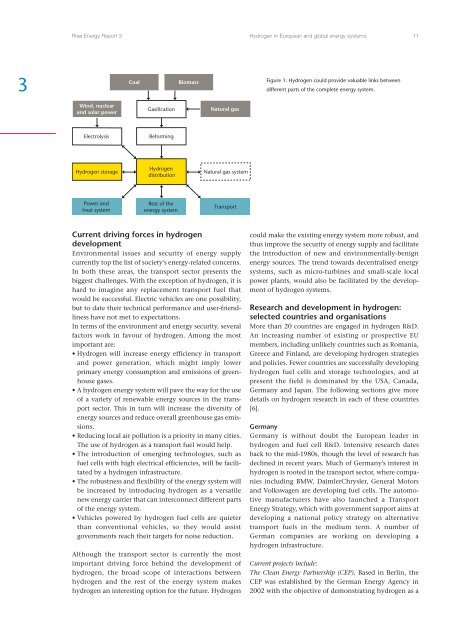10Risø Energy Report 3<strong>Hydrogen</strong> in European <strong>and</strong> global energy systems3development to store hydrogen as a cryogenic liquid ininsulated tanks or within solid materials, includingmetal hydrides <strong>and</strong> nanoporous materials such as activatedcarbon or organometallic compounds.Applications for hydrogen as a fuel include portableequipment, transport, power generation (centralised ordispersed) <strong>and</strong> industrial processes. For power generation<strong>and</strong> industrial applications, hydrogen can be burned as asubstitute for natural gas. For transport, hydrogen can beused in a gasoline engine with only minor modifications.High-purity hydrogen, however, is used to best advantagein high-efficiency technologies such as fuel cells. 2 Afuel cell produces electricity, heat <strong>and</strong> water through anelectrochemical process whose inputs are oxygen fromthe air <strong>and</strong> a fuel such as hydrogen. Fuel cells have manyuseful characteristics, including modularity, good loadfollowingability, almost no noise <strong>and</strong>, when usinghydrogen, almost no emissions.Fuel cells come in many varieties. Low-temperaturedesigns such as proton exchange membrane fuel cells(PEMFCs, also known as polymer electrolyte membranefuel cells) are mostly aimed at portable <strong>and</strong> transportapplications. High-temperature designs such as solidoxide fuel cells (SOFCs) are better for stationary powerplants.At the point of use, burning hydrogen as a fuel has verylittle impact on the environment. There are no emissionsof greenhouse gases, nor of most other pollutants. If airis used as the oxygen source, nitrous oxide will bepresent in the exhaust gases <strong>and</strong> may need to becontrolled, as with any other combustion technology.The total environmental impact of hydrogen thereforedepends almost entirely on the way the hydrogen isproduced. <strong>Hydrogen</strong> energy systems based on renewableenergy sources such as wind or solar power are amongthe most environmentally-benign systems known today.The transport <strong>and</strong> distribution of hydrogen is an importantissue that does not always get the attention itdeserves. The use of large amounts of hydrogen worldwidewill require a comprehensive <strong>and</strong> very costly infrastructure,which only can be developed in a long timeperspective. To keep costs at a reasonable level, thisinfrastructure will have to be used at close to fullcapacity, making the smooth transition to hydrogen animportant challenge for society <strong>and</strong> industry [5].Once in place, however, a hydrogen infrastructure wouldhave several advantages. Working alongside the existinggrids for electricity, natural gas <strong>and</strong> district heating, ahydrogen grid could act as a fourth “backbone” thatwould link the other three energy sources as well asproviding energy in <strong>its</strong> own right (figure 1). <strong>Hydrogen</strong>could be distributed locally, regionally or nationally, <strong>and</strong>could even be carried by the existing natural gas grid,with some modifications. 3 Alternatively, a proportion ofhydrogen could simply be blended with the supply ofnatural gas.<strong>Hydrogen</strong> is easy to use because of <strong>its</strong> versatility, in termsof both manufacture <strong>and</strong> end-use. <strong>Hydrogen</strong> couldprovide the link between renewable energy <strong>and</strong> thetransport sector, transforming biomass, solar <strong>and</strong> windenergy into transport fuel <strong>and</strong> reducing dependence onoil. A hydrogen economy is expected to substantiallyimprove the security of energy supply for the transportsector.Besides <strong>its</strong> potential as a fuel or energy transport mediumin the transport <strong>and</strong> power generation sectors, hydrogencould have an important role as a way to store surplusenergy. Fuel cells normally used to produce electricityfrom hydrogen can be designed to switch into reverse<strong>and</strong> produce hydrogen from electricity. At periods whenelectricity is cheap – when the wind is blowing strongly,for instance, so that wind farms are producing morepower than the grid requires – this surplus electricity canbe used to make hydrogen, which is then stored forfuture use. This “buffer” principle could be used at allscales, from centralised power stations right down tosmall fuel cells in private cars.However, especially with regard to complex energysystems, the overall efficiency from primary energy toend use has to be considered carefully <strong>and</strong> considerabledrawbacks are here identified for a hydrogen system,because of <strong>its</strong> long energy conversion chain. Whenhydrogen is produced out of electricity <strong>and</strong> then reversedback into electricity again, there are great losses <strong>and</strong>therefore additional advantages <strong>and</strong> added values shouldbe observed to justify such a system from an energy-efficientpoint of view.One of the most important advantages of hydrogen is <strong>its</strong>potential to replace gasoline <strong>and</strong> diesel as transport fuels,<strong>and</strong> thus to eliminate air pollution directly from vehicles.However it is produced, hydrogen cannot atpresent compete with conventional transport fuels inpurely economic terms. However, within 10-20 years thesupply of oil is expected to peak, while dem<strong>and</strong> willprobably continue to grow, so in the medium to longterm the price of oil is expected to increase. Nevertheless,the introduction of a hydrogen system has to be seen asa long-term option. Although hydrogen will becomecheaper as technology improves <strong>and</strong> dem<strong>and</strong> increases,hydrogen is not expected to become cost-competitive asa transport fuel in another 10-30 years time. Even if thedevelopment of a hydrogen infrastructure is given a highpriority in terms of costs <strong>and</strong> political willingness, itcannot be expected to be in place before 20-40 yearsfrom now.2. Not all the hydrogen production methods discussed here provide high-purity hydrogen. Expensive purification processes may be needed to purifyhydrogen made by reforming processes, for instance. On the other h<strong>and</strong>, some types of fuel cells do not require high-purity hydrogen.3. Most conventional natural gas pipelines are able to carry hydrogen, though compressors <strong>and</strong> valves may have to be adapted or replaced.
Risø Energy Report 3<strong>Hydrogen</strong> in European <strong>and</strong> global energy systems 113CoalBiomassFigure 1: <strong>Hydrogen</strong> could provide valuable links betweendifferent parts of the complete energy system.Wind, nuclear<strong>and</strong> solar powerGasificationNatural gasElectrolysisReforming<strong>Hydrogen</strong> storage<strong>Hydrogen</strong>distributionNatural gas systemPower <strong>and</strong>heat systemRest of theenergy systemTransportCurrent driving forces in hydrogendevelopmentEnvironmental issues <strong>and</strong> security of energy supplycurrently top the list of society's energy-related concerns.In both these areas, the transport sector presents thebiggest challenges. With the exception of hydrogen, it ishard to imagine any replacement transport fuel thatwould be successful. Electric vehicles are one possibility,but to date their technical performance <strong>and</strong> user-friendlinesshave not met to expectations.In terms of the environment <strong>and</strong> energy security, severalfactors work in favour of hydrogen. Among the mostimportant are:• <strong>Hydrogen</strong> will increase energy efficiency in transport<strong>and</strong> power generation, which might imply lowerprimary energy consumption <strong>and</strong> emissions of greenhousegases.• A hydrogen energy system will pave the way for the useof a variety of renewable energy sources in the transportsector. This in turn will increase the diversity ofenergy sources <strong>and</strong> reduce overall greenhouse gas emissions.• Reducing local air pollution is a priority in many cities.The use of hydrogen as a transport fuel would help.• The introduction of emerging technologies, such asfuel cells with high electrical efficiencies, will be facilitatedby a hydrogen infrastructure.• The robustness <strong>and</strong> flexibility of the energy system willbe increased by introducing hydrogen as a versatilenew energy carrier that can interconnect different partsof the energy system.• Vehicles powered by hydrogen fuel cells are quieterthan conventional vehicles, so they would assistgovernments reach their targets for noise reduction.Although the transport sector is currently the mostimportant driving force behind the development ofhydrogen, the broad scope of interactions betweenhydrogen <strong>and</strong> the rest of the energy system makeshydrogen an interesting option for the future. <strong>Hydrogen</strong>could make the existing energy system more robust, <strong>and</strong>thus improve the security of energy supply <strong>and</strong> facilitatethe introduction of new <strong>and</strong> environmentally-benignenergy sources. The trend towards decentralised energysystems, such as micro-turbines <strong>and</strong> small-scale localpower plants, would also be facilitated by the developmentof hydrogen systems.Research <strong>and</strong> development in hydrogen:selected countries <strong>and</strong> organisationsMore than 20 countries are engaged in hydrogen R&D.An increasing number of existing or prospective EUmembers, including unlikely countries such as Romania,Greece <strong>and</strong> Finl<strong>and</strong>, are developing hydrogen strategies<strong>and</strong> policies. Fewer countries are successfully developinghydrogen fuel cells <strong>and</strong> storage technologies, <strong>and</strong> atpresent the field is dominated by the USA, Canada,Germany <strong>and</strong> Japan. The following sections give moredetails on hydrogen research in each of these countries[6].GermanyGermany is without doubt the European leader inhydrogen <strong>and</strong> fuel cell R&D. Intensive research datesback to the mid-1980s, though the level of research hasdeclined in recent years. Much of Germany's interest inhydrogen is rooted in the transport sector, where companiesincluding BMW, DaimlerChrysler, General Motors<strong>and</strong> Volkswagen are developing fuel cells. The automotivemanufacturers have also launched a TransportEnergy Strategy, which with government support aims atdeveloping a national policy strategy on alternativetransport fuels in the medium term. A number ofGerman companies are working on developing ahydrogen infrastructure.Current projects include:The Clean Energy Partnership (CEP). Based in Berlin, theCEP was established by the German Energy Agency in2002 with the objective of demonstrating hydrogen as a
















